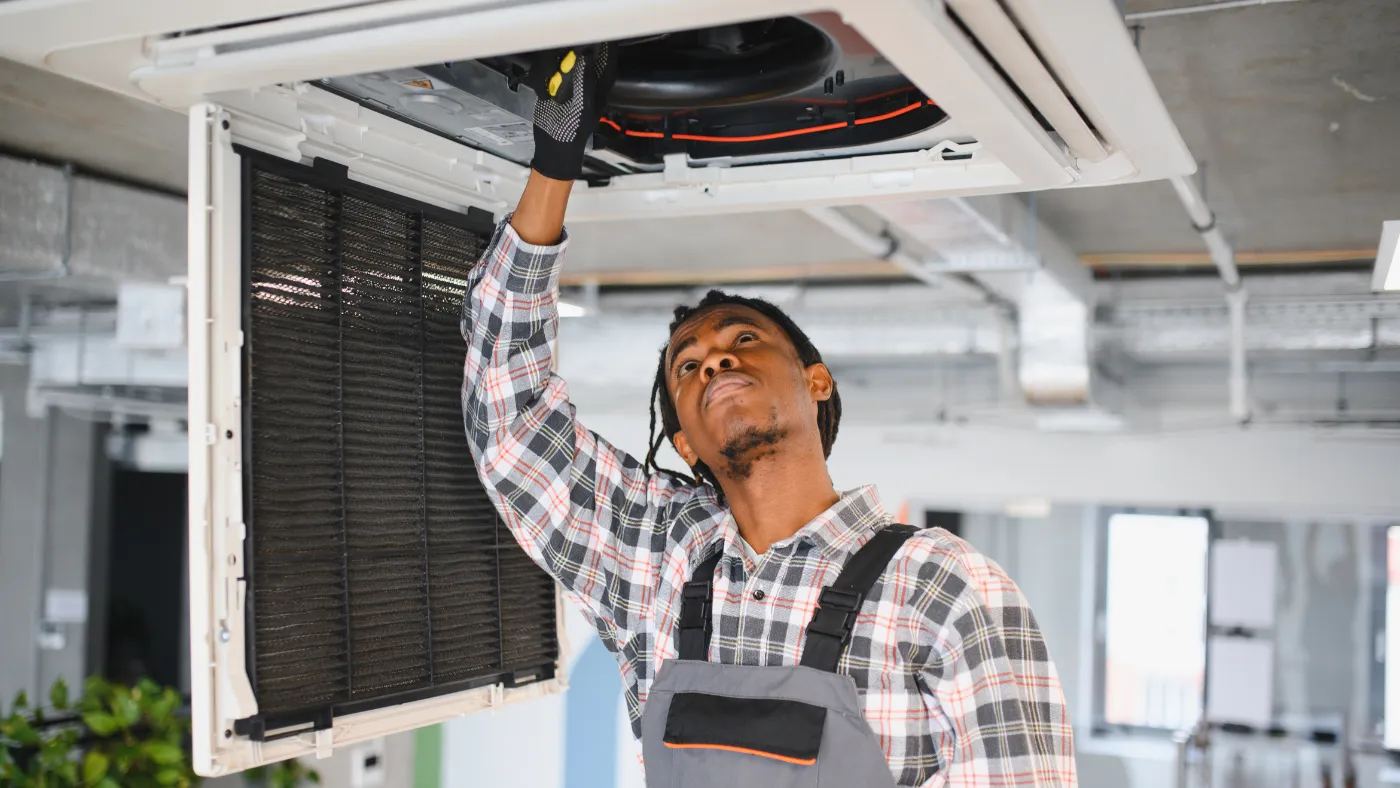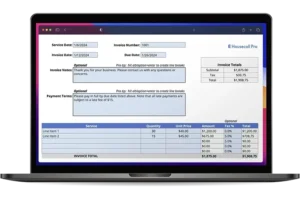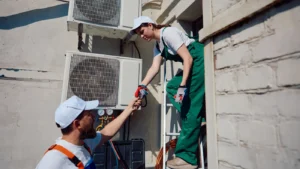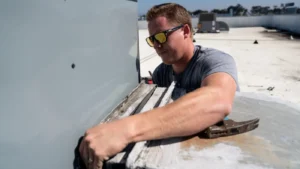
Want to see your potential revenue?
See what businesses like yours earn with Housecall Pro in 1 - 2 minutes.

Whether you’re just starting out in the HVAC field or looking to level up your career, knowing how much commercial HVAC work pays can help you plan your next move. This guide breaks down average salaries for commercial HVAC techs across the United States. We’ll also give advice to boost your wages, details on high-paying positions, and helpful links to get you started.
Key takeaways
Here’s a quick overview of factors that affect commercial HVAC pay and top earning areas:
Average commercial HVAC salary: Most commercial HVAC techs earn $55,000–$65,000 per year, or $26–$33 per hour.
Top-paying areas: Colorado, North Dakota, New England, and the Pacific Northwest have the highest commercial HVAC salaries.
Major pay factors: Geographic location and niche skills have the largest impact on your annual pay.
Highest-paying roles: HVAC mechanical design engineers, thermal engineers, and CFD engineers have the highest average annual wages.
Jump ahead
- Average commercial HVAC tech salary in the U.S.
- How much commercial HVAC techs make by state
- What states pay commercial HVAC techs the most?
- What states pay commercial HVAC techs the least?
- Commercial HVAC salary by experience level
- Highest-paying commercial HVAC jobs
- What affects a commercial HVAC professional’s salary?
- Starting your own commercial HVAC business
Average commercial HVAC tech salary in the U.S.
According to 2025 data, commercial HVAC technicians make an average of $31 per hour, or $65,448 per year.* However, your pay can vary widely depending on where you live, how saturated the job market is, and your level of training. Here’s a quick overview of lowest to highest ranges:
- Hourly wage: $16.35–$43.03
- Weekly wage: $654–$1,721
- Monthly wage: $2,833–$7,458
- Annual wage: $34,000–$89,500
Newly licensed HVAC techs can expect to earn towards the lower end of the ranges above, while veteran HVAC experts with specialty skills can expect to earn near the top. If you have multiple certifications and licenses for niche work, you can make close to six figures or more. This is especially true in high-cost-of-living metro areas or states with a high demand for commercial HVAC work.
Note: Commercial HVAC techs tend to make more than those focused on residential work. Learn more in our guide to residential HVAC technician salaries.
*All information in this guide is based on 2025 data from reputable salary sites such as ZipRecruiter and Indeed.
Learn more: How to Become an HVAC Technician: Step-by-Step Guide
How much commercial HVAC techs make by state
Location has one of the biggest impacts on your earning potential as a commercial HVAC tech, with a gap of about $25,000 per year between the highest-paying state (Colorado) and lowest (Florida). Here’s a look at what you can expect to make in each state:
| State | Hourly | Annual |
| Alabama | $29 | $59,321 |
| Alaska | $33 | $68,110 |
| Arizona | $29 | $60,990 |
| Arkansas | $26 | $54,119 |
| California | $31 | $64,591 |
| Colorado | $35 | $73,509 |
| Connecticut | $32 | $66,502 |
| Delaware | $31 | $65,504 |
| Florida | $24 | $48,909 |
| Georgia | $27 | $55,263 |
| Hawaii | $33 | $67,998 |
| Idaho | $30 | $61,579 |
| Illinois | $30 | $63,420 |
| Indiana | $30 | $62,278 |
| Iowa | $30 | $61,473 |
| Kansas | $28 | $58,369 |
| Kentucky | $27 | $56,843 |
| Louisiana | $27 | $55,966 |
| Maine | $30 | $63,366 |
| Maryland | $31 | $63,520 |
| Massachusetts | $34 | $71,477 |
| Michigan | $27 | $57,044 |
| Minnesota | $31 | $64,100 |
| Mississippi | $30 | $61,983 |
| Missouri | $30 | $61,390 |
| Montana | $29 | $60,071 |
| Nebraska | $30 | $62,401 |
| Nevada | $27 | $56,572 |
| New Hampshire | $31 | $63,848 |
| New Jersey | $32 | $66,445 |
| New Mexico | $27 | $56,964 |
| New York | $31 | $64,310 |
| North Carolina | $29 | $59,479 |
| North Dakota | $33 | $69,249 |
| Ohio | $30 | $62,221 |
| Oklahoma | $29 | $60,430 |
| Oregon | $33 | $69,197 |
| Pennsylvania | $32 | $65,605 |
| Rhode Island | $28 | $57,566 |
| South Carolina | $29 | $60,733 |
| South Dakota | $31 | $65,448 |
| Tennessee | $29 | $59,401 |
| Texas | $29 | $60,975 |
| Utah | $29 | $59,582 |
| Vermont | $32 | $67,244 |
| Virginia | $31 | $64,886 |
| Washington | $34 | $71,629 |
| West Virginia | $24 | $50,668 |
| Wisconsin | $31 | $63,835 |
| Wyoming | $29 | $60,791 |
| Washington, D.C. | $33 | $67,761 |
Data: ZipRecruiter, 2025
What states pay commercial HVAC techs the most?
States with high costs of living and strong demand for commercial HVAC techs tend to pay the most. Examples include North Dakota, Massachusetts, Oregon, Washington, and Colorado. North Dakota has especially high demand for commercial HVAC techs who can handle boiler work and other niche skills tied to the oil and gas industry, while Colorado’s fast population growth continues to drive steady work for commercial pros.
| State | Low | Median | High |
| Colorado | $38,370 | $73,509 | $104,100 |
| Washington | $38,508 | $74,126 | $101,367 |
| Massachusetts | $37,132 | $71,477 | $97,744 |
| North Dakota | $35,975 | $69,249 | $94,699 |
| Oregon | $35,948 | $69,197 | $94,628 |
What states pay commercial HVAC techs the least?
The low cost of living in the South and Southeast drives wages down for commercial HVAC techs. Louisiana, Arkansas, and West Virginia have stagnant population growth and low demand. Many jobs in these states are simply replacing older technicians who retire.
While several urban areas in Florida and Georgia see strong population growth and more demand for HVAC professionals, rural areas often don’t. Wages in cities are considerably higher in these states than in smaller towns.
| State | Low | Median | High |
| Florida | $25,408 | $48,909 | $66,882 |
| West Virginia | $26,322 | $50,668 | $69,288 |
| Arkansas | $28,115 | $54,119 | $74,007 |
| Georgia | $28,709 | $55,263 | $75,572 |
| Louisiana | $29,074 | $55,966 | $76,534 |
Commercial HVAC salary by experience level
As with any job, your earning potential as a commercial HVAC tech will increase as you gain more experience, specialized skills, and knowledge of complex systems.
As an apprentice, you’ll be paid as you learn. After a few years, you can apply for your journeyman license—then. later, a contractor’s license. Even if you don’t start your own HVAC business right away, you can still earn a very good wage with a contractor or other specialty license.
Here’s a look at how your salary can increase over time:
| Experience Level | Annual Salary | Hourly Rate |
| Entry level (0–2 years) | $44,248 | $18.97 |
| Intermediate (2–4 years) | $59,651 | $29.76 |
| Senior (4+ years) | $94,518 | $52.38 |
Highest-paying commercial HVAC jobs
You don’t have to open your own business to make a good living in commercial HVAC. With specialized education and training, you could land one of these top-paying positions:
- HVAC mechanical design engineer ($100,000–$120,000): Designs complex HVAC systems for new buildings or redesigns older systems to bring them up to code.
- CFD engineer ($85,500–$110,000): Uses computational fluid dynamics (CFD) to model and optimize HVAC systems for performance and energy efficiency.
- Thermal engineer ($80,000–$129,000): Works with heat transfer systems in industrial or aerospace applications.
- HVAC project manager ($80,000–$112,000): Oversees and manages HVAC installation projects in commercial buildings, including multi-property residences.
- HVAC consultant ($79,590): Provides expert recommendations on installations and upgrades.
- HVAC controls technician ($60,500–$80,000): Installs and programs building automation systems.
- HVAC general manager ($58,000–$87,500): Manages HVAC teams and operations for corporations or as a contractor managing project crews.
Get In Touch: 858-842-5746
Let us earn your trust
On average, Pros increase monthly revenue generated through Housecall Pro by more than 35% after their first year.
See plan options and feature breakdown on our pricing page.
What affects a commercial HVAC professional’s salary?
Getting a commercial HVAC license is just the first step. If you have specialty skills, your talents will be in higher demand and you can command a much higher salary.
Your pay is also influenced by:
- Certifications and specializations: All HVAC professionals working with refrigerants must have an EPA Section 608 license, but the universal (Type IV) certification opens more doors. North American Technician Excellent (NATE) certifications also prove your ability to perform in-demand specialty work.
- Role and leadership: Leadership positions typically pay more, as they require both HVAC expertise and people skills. Specialists can earn comparable amounts if their skills are rare and in demand.
- Industry demand and trend context: The U.S. Bureau of Labor Statistics (BLS) estimates commercial HVAC job growth will increase by about 8% by 2034. Areas with higher rates of commercial or industrial development, like North Dakota, have higher demand and stronger earning potential.
Danny Reddick, founder and president of Reddick & Sons, suggests prioritizing certifications like NATE that directly impact your business. “These certifications are building blocks for your reputation; they prove you’re not just a handyman with a wrench.”
Starting your own commercial HVAC business
As a business owner, you have more responsibility than you would working as an employee, but you also have the potential to earn much more. Opening your own commercial HVAC business gives you more control over the types of jobs you’ll do. You can specialize, consult, or offer subcontractor services.
But having HVAC skills is just one element of success. You’ll also need to manage labor, supplies, pricing, and marketing.
Housecall Pro is the business operations and marketing assistant you need to keep your business running smoothly. Our commercial HVAC field software helps you:
- Schedule and dispatch jobs efficiently
- Automate invoices and payments
- Track performance metrics and profitability
- Manage customer relationships for repeat business and referrals
- Store certifications and licenses for you and your crew
Start your free 14-day free trial today to see how much Housecall Pro can help your business thrive.
FAQ
-
Do commercial HVAC technicians earn more than residential techs?
-
Yes, commercial systems are more complex than residential systems and require more specialized knowledge and skills, so pay is higher.
-
Do commercial HVAC techs get overtime pay?
-
Yes, if you’re hourly and work overtime, your employer is legally required to pay you overtime. Even salaried commercial HVAC techs may receive overtime pay or other bonuses for working on-call or during emergencies.
-
Is there a difference in pay for working on industrial HVAC systems?
-
Yes, industrial HVAC systems are quite complex, and many use specific types of refrigerant that require specific certifications. This can lead to higher pay.
-
Do employers pay for continuing education or advanced training?
-
Many employers pay for continuing education and training for their techs. If state or federal regulations for HVAC work change and require certain licensure or training, most employers will cover the necessary training. However, they aren’t required to pay for your training, so ask about opportunities when you’re interviewing.







